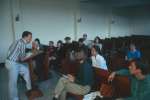|
|
||||
| Prev |
Guatemala 2000 A photo journal by David Booth |
Next | ||
|
|
||||
|
|
||||
| Prev |
Guatemala 2000 A photo journal by David Booth |
Next | ||
|
|
||||
Another full day. In the morning we crossed the city to meet with Dr. Hector Castaņeda, pastor of the San Juan Apostle Church, who spoke to us about the poor working conditions, the lack of workers' rights, the maquilas ("sweat shops"), and the corrupt legal system in Guatemala. He was exiled to Mexico for 8 years, and lived in USA for 15 years where he obtained his Ph.D. In 1985 he returned to Guatemala and worked for an independent maquila monitoring institution before becoming a pastor.

Reverend Dr. Hector Castaņeda. |
The worst thing in Guatemala is the presence of a corrupt legal system from top to bottom. But this is just the fallout of what started in 1954. Since 1996, when the Peace Accords were signed, a democratic process started, but even that seems like a joke, and the only thing that is actually a little better are the infrastructures.
As for the situation of workers, the union system was just about destroyed from the 1970's on. A lot of people died during the union struggles; many others left for the US, Canada or Europe and never came back.
Most people that work in the maquilas come from the slums, and they usually get no support either from other laborers or from the unions. Maquilas workers have no rights and no legal protection. Therefore, their bosses can do whatever they want and treat them however they want. Because of the lack of resources, the workers cannot even push for a commission for labor rights when abuses occur. For example, a single mother that needs to support her family and work, has no choice other than putting her kids in day-care; the maquila is supposed to provide on-site day-care services, but they don't. So, when the mother is 15 minutes late because she had to walk very far to take her kids to relatives or another day-care, half of her day wage is deducted. This woman has no recourse.

Reverend Dr. Hector Castaņeda. |
The Internal Department and the Labor Department are actually well aware of the maquilas situation. They are the ones that have the information about the owners: lack of access to basic on-site services, the illiteracy rate of the workers, etc. I do not know much now, because we are only allowed to go visit a few of the maquilas -- only those that not terrible, although they are still bad. A piece of information that is known though, is that most of the maquilas owners are Korean.
The workers' situation is really upsetting, and unfortunately there is no formal account of what their numbers are (the closest number is an estimate of 200,000 people in Guatemala City alone) or what are their wages, etc. Of course very few maquilas pay social security (although it is always deducted from the paychecks), so there are no records. The owners frequently keep two books: a real one and a public one. But even when the inspectors do come, they can be easily be paid off to keep silent.
Some American companies, pushed by public pressure, have done research and carried out studies on maquilas. However, they end up not liking the results, and playing with the numbers, since it is in their economic interest for the situation to stay the same. Some of these American companies also requested verification of codes of conduct, but these verifications were based on the agreement that the companies would own all of the information gathered and would still be able to make final decisions about its use. In this sense, US companies are very hypocritical, because they accuse the Koreans of violating workers' rights, when they do just the same.

Catherine (left) listens as my dad expresses his gratitude for being here -- both to hear Dr. Castaņeda speak so eloquently, and to see Guatemala with his own eyes. |
The public and social systems need to be strengthened, and all international aid should be continued, even when the situation seems to get better, because the reality is that the Guatemalan people still have their hands tied. There was this man, Edgar Gutierrez, who used to be a true activist (he contributed to the REMHI report as well), but he was assigned to the Security Office, where he can be kept under control, and he's now being supervised by one of the men that is known to have been one of the worse oppressors during the war.
My role as a pastor is also difficult, because my congregation is very diverse: there are members of CASIF (chamber of commerce members and business men -- those that have the most power in Guatemala), Mayans, ex-army generals, activists and housewives. And I have to preach to them all, hoping that they will be touched by what I say. After all, the people that are part of the problem are also part of the solution. My main hope is that the next election will bring the left back in the presidency, but unfortunately Guatemalans are impressed by great speakers, and the leftist front-runners, although very intelligent, have been silenced for too many years.
[End of meeting notes]